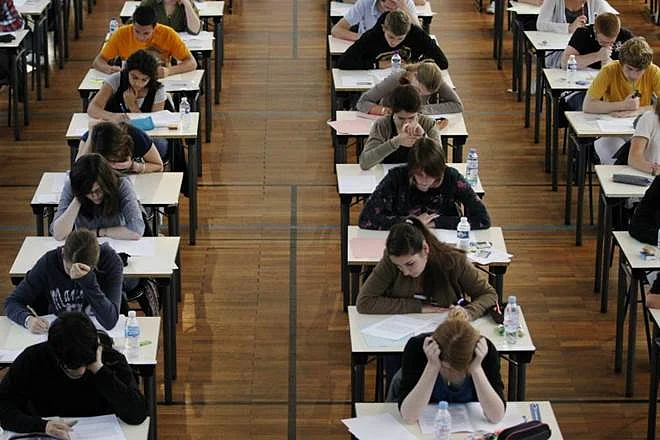
Don't Even Think About Cheating: Rules And Penalties That Every Student Needs To Know
[Editor's Note: This article is part of Khaleej Times' Schools and Parents, a dedicated section designed to support families in the UAE as they explore educational choices. The section offers explainers, guidance from education leaders, expert advice and insights from parents to help readers make informed decisions about schools, curricula and communities.]
As UAE schools gear up for the first-term central exams beginning on November 20, the Ministry of Education (MoE) has reiterated the importance of adhering to its Guide to Combating Cheating and Exam Misconduct.
Recommended For YouThe document underscores the principles of fairness, honesty, and equal opportunity in national assessments, while outlining clear penalties for cheating and holding both students and school staff accountable for any examination-related violations.
Stay up to date with the latest news. Follow KT on WhatsApp Channels.
Here's what every student and parent should know.
1. What is the exam integrity guide about?
The guide sets out detailed rules for how exams should be prepared, supervised, and graded. Its main goal is to protect the credibility of the UAE's national examination system and promote a culture where honesty and responsibility are shared by students, teachers, and parents alike.
2. Why is the Ministry of Education reminding schools about this guide now?
With national exams around the corner, the Ministry wants to remind everyone that academic integrity is non-negotiable.
By laying down clear expectations, the MoE hopes to foster self-discipline, accountability, and respect for fair play-values that extend far beyond the exam hall.
3. How does this guide connect to Federal Law No. 33 of 2023?
The guide is backed by Federal Law No. 33 of 2023, which addresses exam-related offences and cheating.
The law ensures that academic assessments remain credible and trustworthy by imposing strict penalties on anyone-students, staff, or institutions - involved in dishonest practices.
It highlights that cheating is not just a school violation but a legal offence, reflecting how seriously the UAE treats educational integrity.
4. What are schools required to do to comply with the MoE's directives?
Every school must:
- Disseminate the guide to all students, teachers, and parents.
Conduct awareness programmes before exams to explain rules and expected behaviour. Form internal supervisory committees to monitor exams and report any irregularities.
Cooperate with random inspection visits by local education authorities and MoE assessment teams to ensure full compliance.
5. What actions are considered exam misconduct or cheating?
According to the guide, cheating includes any attempt to gain an unfair advantage. Examples include:
- Using phones, smartwatches, or electronic devices during exams.
Taking photos of question papers or sharing them online. Posting or forwarding questions on social media.
Communicating with another student during the test. Leaving the exam hall without permission.
Distracting or influencing invigilators.
Even digital attempts to access, share, or leak exam content are treated as serious violations.
6. What are the penalties for students caught cheating?
Penalties depend on the nature of the violation but may include:
- Zero marks in the subject where cheating occurred.
12-point deduction from the student's conduct score. Exclusion of the answer paper if it's deliberately damaged.
In some cases, students may also be referred to behavioural rehabilitation programmes under the MoE's Behaviour Assessment Initiative, which aims to promote responsibility and ethical decision-making.
7. Can teachers or school staff also face penalties?
Yes. The Ministry has made it clear that accountability applies to everyone.
If a teacher or staff member helps a student cheat or breaches exam confidentiality, they could face:
- Fines of up to Dh200,000,
Administrative penalties under federal employment laws, or Referral to authorities for further disciplinary measures.
8. How will the Ministry ensure that schools follow the rules?
To uphold transparency, assessment teams and education authority inspectors will conduct unannounced visits to examination centres and grading venues.
These visits are designed to ensure all schools strictly follow the Ministry's procedures and that every student is evaluated fairly.
9. What message does the Ministry have for students and parents?
The Ministry urges students to take pride in their honest effort and see exams as an opportunity to demonstrate what they've learned.
Parents are encouraged to model and reinforce values of honesty, respect, and fairness at home, helping their children understand that integrity is a lifelong strength-not just an exam rule.
10. Why is academic integrity so important?
Academic integrity is the foundation of learning and personal growth. It ensures fairness among students, maintains the credibility of UAE's education system, and prepares young people to become ethical, responsible citizens in the future.

Legal Disclaimer:
MENAFN provides the
information “as is” without warranty of any kind. We do not accept
any responsibility or liability for the accuracy, content, images,
videos, licenses, completeness, legality, or reliability of the information
contained in this article. If you have any complaints or copyright
issues related to this article, kindly contact the provider above.

















Comments
No comment